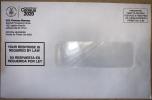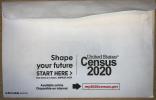Frequently Asked Questions
FREQUENTLY ASKED QUESTIONS
Will the Census ask if I'm a US citizen?
The 2020 US Census will not include any question(s) about citizenship.
Are my answers safe and confidential? YES!
Your responses to the 2020 Census are safe, secure, and protected by federal law. Your answers can only be used to produce statistics - they cannot be used against you in any way. By law, all responses to U.S. Census Bureau household and business surveys are kept completely confidential. The U.S. Census Bureau is bound by Title 13 of the United States Code.
This law not only provides authority for the work we do, but also provides strong protection for the information we collect from individuals and businesses. As a result, the Census Bureau has one of the strongest confidentiality guarantees in the federal government.
It is against the law for any Census Bureau employee to disclose or publish any census or survey information that identifies an individual or business. This is true even for inter-agency communication: the FBI and other government entities do not have the legal right to access this information. In fact, when these protections have been challenged, Title 13's confidentiality guarantee has been upheld. Click here for a Fact Sheet.
For more information, click the language best suited for you:
English Arabic Portuguese Spanish
Is this different than the Annual Census the Town of Weymouth already collected?
YES. The Town of Weymouth is required by state law (MGL Chapter 51 Section 4), to conduct an Annual City Census of all residents 3 years of age and older. The Census form is mailed to every household in Weymouth. This information is necessary to protect your voting rights and to provide better municipal services.
The US Census is required under the U.S. Constitution every 10 years and is used to determine congressional representation and federal funding. Under Title 13, responses to the US Census are kept confidential.
When and how will I receive the Census?
The first round of mailings should already have been received.
The envelope looks like this: 

By mid to late-April, we'll mail a paper questionnaire to every household that hasn't already responded. (Some households will receive a paper questionnaire along with the first invitation in March.)
Braille and large print guides will be available online to assist you with completing the paper questionnaire.
If necessary, you can respond in person beginning in mid to late-May. Census takers will visit all households that have not yet responded and census takers will be available who can communicate in American Sign Language and other languages.
When the census taker visits to help you respond, you can request that another census taker who communicates in American Sign Language returns, if you prefer.
You can respond by phone in English or in 12 additional languages. You can also respond in English by TDD at 844-467-2020.
More information can be found here.
What will the Census form look like?
Households will be able to respond to the 2020 Census online, over the phone, or through a paper questionnaire. Click here for a sample of the paper questionnaire that will be used during the 2020 Census. This version excludes some features that will be made available to households starting in March 2020, such as the URL for online response and the contact information for phone response.
If I am living here temporarily, what do I do?
- Citizenship status
- Social Security numbers.
- Bank or credit card account numbers.
- Money or donations.
- Anything on behalf of a political party.
Strict federal law protects your census responses. It is against the law for any Census Bureau employee to disclose or publish any census information that identifies an individual. Census Bureau employees take a lifelong pledge of confidentiality to handle data responsibly and keep respondents’ information private. The penalty for wrongful disclosure is a fine of up to $250,000 or imprisonment for up to 5 years, or both.
No law enforcement agency (not the DHS, ICE, FBI, or CIA) can access or use your personal information at any time. Data collected can only be used for statistical purposes that help inform important decisions, including how much federal funding Weymouth receives.

